At the invitation of Jeonju mayor and Jeonju U. CCIK president
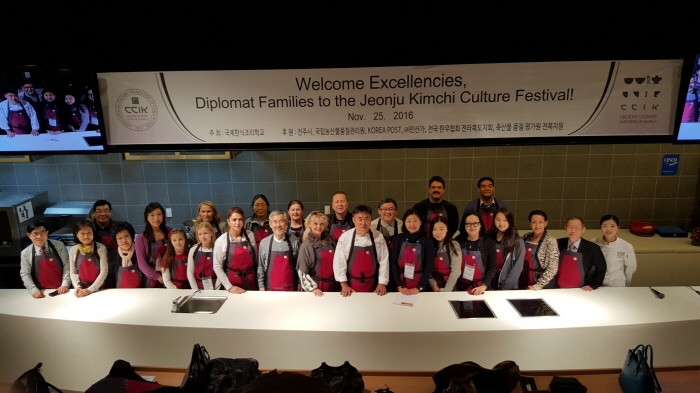
Ambassadors and senior diplomats, with their spouses, had a rare opportunity to have an hands-on experience in making the noted genuine Jeolla Gimjang (Winter) Gimchi at the Jeonju National University on Nov. 25, 2016. Ambassadors AskarBeshmov of the Kyrgyz Republic and Mihai Ciompec of Romania, together with a number other senior diplomats and their spouses visited the University in the Jeonju City, Jeollanam-do Province, had a rare opportunity to tour a number of noted sites of the City as well as the interesting Kimchi-making experience.
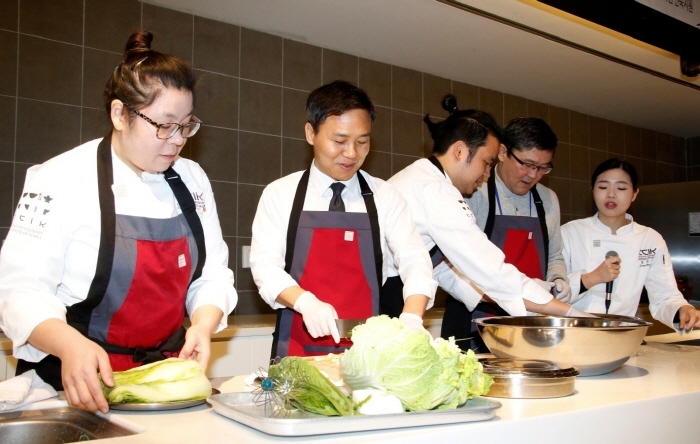
The visiting ambassadors and other senior diplomats, with their spouses, were warmly received by Mayor Kim Seung-su of the Jeonju City of Jeollabuk-do Province and President Min Kye-Hong of the Creative Culinary Institute of Korea (CCIK) at the Jeonju University on that day.
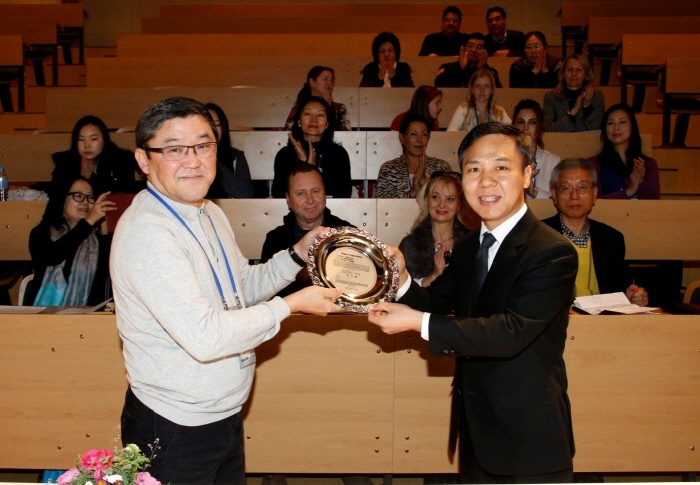
On the same day, the visiting ambassadors, other senior diplomats and their spouses also visited the traditional Korean folk village of HanokMaeul in the Jeonju City and the EN Korea Cosmetics Company, about half an hour away from the Jeonju City, on the way back to Seoul.
Introducing the Jeonju City to the visiting ambassadors and other senior diplomats, Mayor Kim said, “Personally, I meet Mayor Park Won-sun of Seoul quiet often. From time to time on public occasions, he mentions his city is the administrative capital city of Korea. Then I advise him, “Yes, but the Cultural Capital City of Korea is Jeonju.
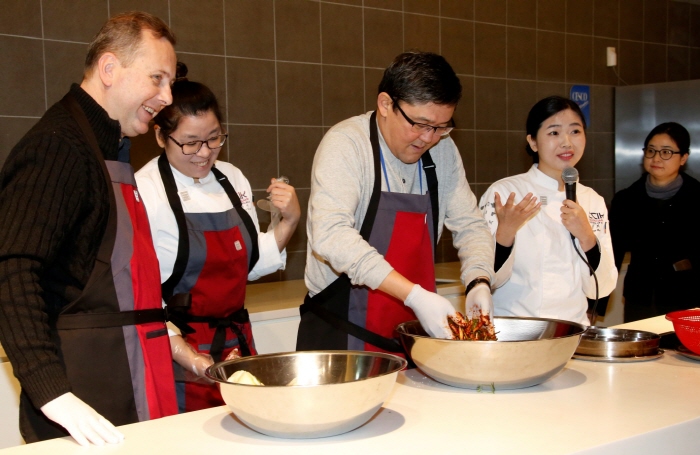
So that many culture-related organizations have moved to Jeonju. The National Institute of Intangible Cultural Heritage which supports human cultural assets is located in our city. Also UNESCO Asia Pacific Intangible Heritage Center is in Jeonju as well.”
Mayor Kim’s welcome speech was followed by one by Vice President Choi Woncheol of the Jeonju University. He said in part, “Especially, Jeonju is known as a ‘city with abundant and fresh foods from mountains, fields and the sea and this is why Jeonju has been able to develop local dishes such as the famed JeonjuBibimbap made with bean sprouts, rice, soup, kimchi and other side-dish materials.” (More towards the end of this report.)
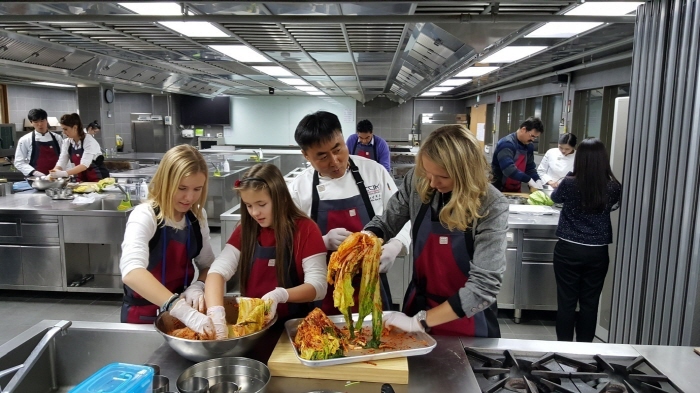
Then came professional remarks from Principal Min Kaehong of the Creative Culinary Institute of Korea. He said, “Food is a source of nutrition but it is also a source of happiness and I hope that this event will provide a good chance for you to understand and enjoy the Korean food and culture.” (See excerpts at the end of this article.)
Attending the tour that day from the Seoul Diplomatic Corps were Ambassador and Mrs. AskarBeshimov of the Kyrgyz Republic, Ambasador and Mrs. Mihai Ciompec of Romania, Mrs. Sarah Bile (spouse of the ambassador of Cote d'Ivoire), Mrs. Mun-AdilMagsarjav, (spouse of the ambassador of Mongolia), Mrs. Edit Csaba (spouse of the Hungarian ambassador), Mrs. KonulTeymurova (spouse of the ambassador of Azerbaijan) and Mrs. Rina Okumura-Vaivara (spouse of the ambassador of Lativa).
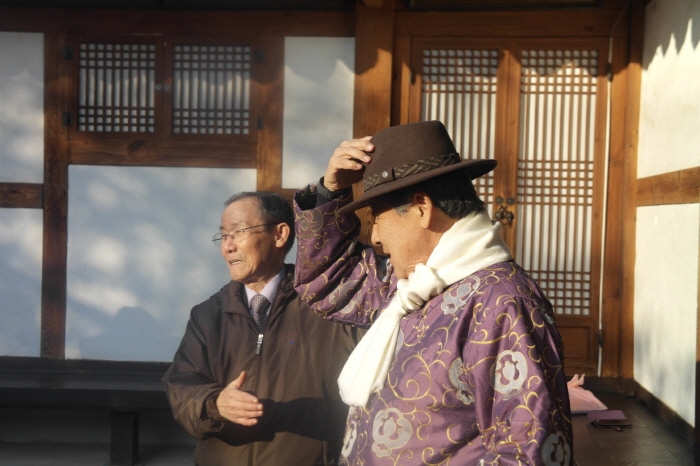
Excerpts from the welcome remarks of Mayor Kim Seungsu of Jeonju:
Good morning, Excellencies and Madams!
I am Kim Seungsu, the mayor of the Jeonju City.
Seoul is Korea’s administrative capital but Jeonju is Korea’s cultural capital city.
Thanks to our traditional culture, food and tourist attractions, around 10 million people visit us annually.
Recently, a US media company, CNN, televised to the whole world that the Lonely Planet, the world travel magazine, had selected 10 cities to visit in Asia this year. The best city was Hokkaido of Japan, the second best city was Shanghai of China and then Jeonju, our city, won the third place as the ‘Best City to Visit.’
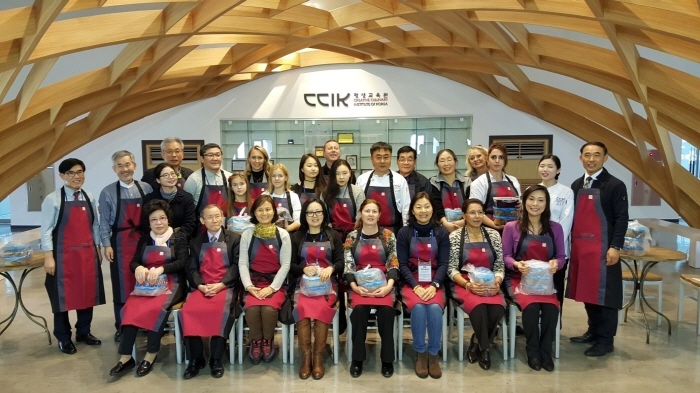
One of Korea’s important legacies is our human cultural asset. The Korean government has designated some people, who have great talent in traditional culture, as the Human Cultural Asset, just like the National Treasures of Korea. These Human Cultural Assets are organized within many different aspects of the Korean traditional culture such as Pansori(Traditional Korean Opera), traditional dance, food, hanji(Traditional Korean Paper), and handi-crafts.
There are around 230 cities and counties in the Republic of Korea. Each city has on the average 1.7 of the human cultural assets; and Jeonju has 41 of them. It means that we have more of them than Seoul does.
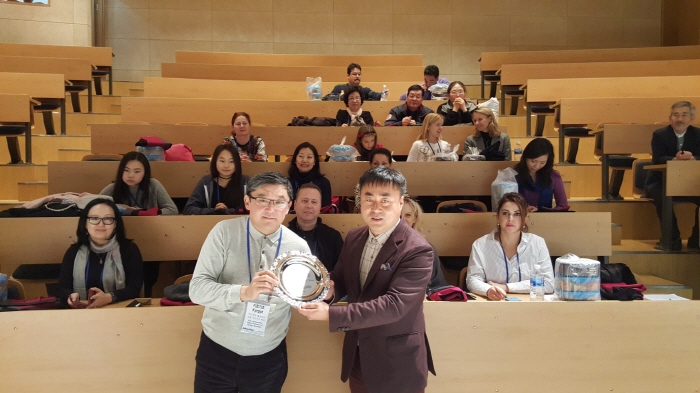
Personally, I meet Mayor Park Won-sun of Seoul quiet often. >From time to time on public occasions, he mentions that the Seoul City is the administrative capital city of Korea. Then I advise him, “Yes, but the Cultural Capital City of Korea is Jeonju.”
So, that many culture-related organizations have moved to Jeonju. The National Institute of Intangible Cultural Heritage which supports the Human Cultural Assets is located in our city. Also the UNESCO Asia Pacific Intangible Heritage Center is in Jeonju as well.
One more thing that I want to share with you is that Jeonju is a UNESCO Creative City of Gastronomy.
I want to thank Chairman Lee Kyung-sik of The Korea Post media and everyone who has put a lot of effort into this special event. Also I want to welcome all the members of the Seoul Diplomatic Corps and their families accredited to Korea.
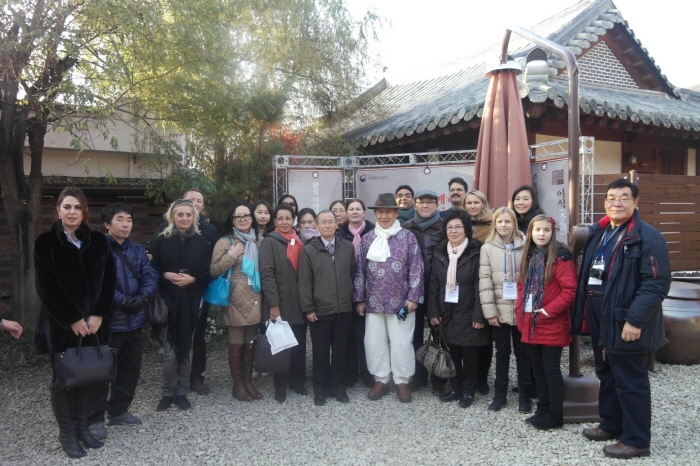
Excerpts from the welcome remarks of Vice President Choi Chul-won of Jeonju University:
I am happy to meet Your Excellencies and other distinguished members of the Seoul Diplomatic Corps visiting us today.
I am Choi Woncheol, the vice president of Jeonju University.
I would like to extend my warm welcome to all the visiting ambassadors, other senior diplomats and their families.
Jeonju is the capital city of traditional Korean culture and also it is a UNESCO Creative City of Gastronomy and International Slow City.
Especially Jeonju is known as a city with abundant and fresh foods and food materials from the mountains, fields and the sea. This is why Jeonju has been able to develop local dishes such as Bibimbap, Bean sprouts, rice soup and Kimchi.
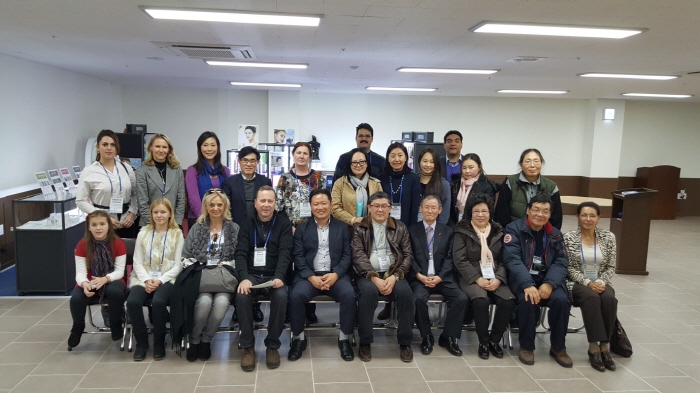
The easiest way to enjoy another culture is to have the food and beverage of the other country. It is said that food represents the life style, culture, philosophy and the times well.
I hope that you will enjoy the beauty and taste of Korea here today at the Creative Culinary Institute of Korea where Korean food and culture co-exist.
I would like to thank Principle Min Kaehong for hosting this special event and thank Mayor Kim Seounsu for adding grace to the occasion with his presence.
Greetings by Principal Min Kaehong of the Creative Culinary Institute of Korea:
Hello. Nice to meet you. I am Min Kaehong, the principle of the Creative Culinary Institute of Korea. I extend my warmest welcome and gratitude to the ambassadors and families for visiting our school today.
The Creative Culinary Institute of Korea is the first Korean cuisine-specializing institute founded in 2012 through joint investment from the government and regional government associations such as the Ministry of Agriculture, Food & Rural Affairs, the Jeollabuk-do province government, the Jeonju city government and the Jeonju University with the object of training international star chefs specializing in Korean cuisine.
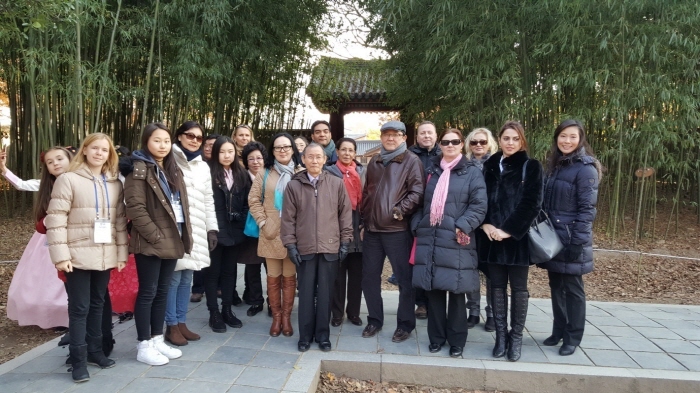
The CCIK alumni shows the taste of Korea not only in Korea but also around the world. Moreover, people from foreign countries such as Japan, America and Turkey, come to the CCIK and learn the Korean cuisine.
Food is a source of nutrition and also is a source of happiness. I hope that this event will prove a good opportunity for you all to understand and enjoy the Korea food and culture.
I would like to thank Mayor Kim Seounsu and Vice President Choi Woncheol for attending this event taking out of their busy schedule.
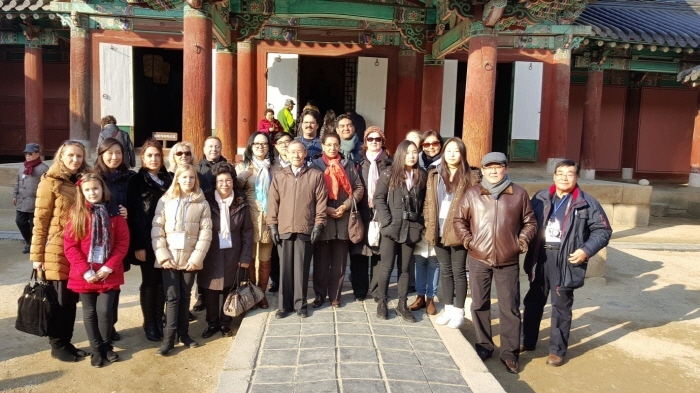
A brief account of Prince Yi Seok:
Yi Seok (born 3 August 1941), according to Wikipedia, is a prince of the House of Yi, the Korean Royal Family. He was described as the "last pretender" to the Korean throne by The New York Times, although this status is not recognized by the Yi family association. Yi gained fame as the "singing prince" with the wedding favorite "Pigeon House" released in 1967. Since 2004, he has been employed by the city of Chonju to promote tourism. He is also a professor of history at Jeonju University. He is a son of Prince Yi Kang, the fifth son of Emperor Gojong of Korea, and his thirteenth wife, Lady Hong Chŏng-sun, a former telephone operator.
Currently, Yi Seok resides in a building renovated for his use by the city of Jeonju, 243 kilometers south of Seoul. The city government hopes that Yi Seok's settlement on the grounds of its Hanok Village will spotlight the historic significance of the city and help it to attract tourists. As part of this arrangement, Seok gives lectures to Jeonju visitors about Korean history. He also frequently lectures elsewhere and is often called upon for ceremonial duties, despite his official status as a private citizen. Recently, Seok authored a book about the late Joseon Dynasty royal court family and has founded an organization, which he now leads, "The Imperial Grandson Association", dedicated to preserving the culture of the royal court.
Yi Seok was born and raised in Sadong Palace in Seoul during the Japanese occupation. After WW2 ended with the occupation and partition of Korea by the allies in the South, and the Russians and Chinese in the north, the Korean Imperial family was rendered homeless, what assets that were not confiscated by the Japanese were then confiscated by the incoming Syngman Rhee government, and forced to temporary accommodation within palaces in Seoul.
The coming of the Korean War in the summer of 1950 led the cadet elements of the Imperial family to flee by an American landing craft from Incheon, along the coast down to Busan, then to live in a hillside monastery in Jeju Island till the war ended in the autumn of 1953 when they returned to Seoul.
Yi Seok as a young man was required to look after his family as best he could, along with his brothers, and took any jobs that he could to provide for his parents and siblings before and after university during the hard times of the Korean War and Cold War era as the Republic of Korea fought communism and internal subversion.
At Hankook University of Foreign Studies in Seoul, Yi Seok studied foreign languages, principally Spanish, as well as foreign relations and history, became fluent in several languages, and prepared himself for the diplomatic service. A series of coups, changes in government and civil discord rendered that impossible. Paying his own way through university, Seok again worked at many different jobs to provide for his family, and as he had an aptitude for entertaining, became a well known singer and professional musician in the 1960s while in his twenties, having several hit songs.
Military service

